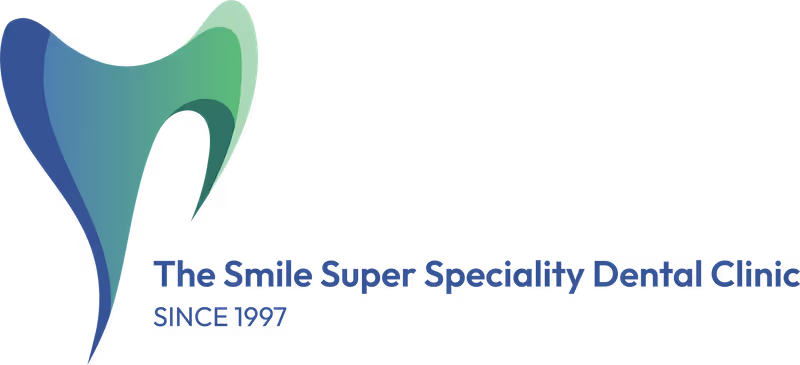The Real Reason Your Breath Still Smells (Even After Brushing)
By Dr. Rajesh, Founder of The Smile Super Speciality Dental Clinic, Kondapur
You brush twice a day. You use mouthwash. You carry mints everywhere. Yet people still step back when you speak, and you catch your colleagues covering their noses during meetings.
Sound familiar?
If you're struggling with persistent bad breath despite good oral hygiene, you're not alone – and more importantly, you're probably treating the wrong problem entirely.
After 30 years of practicing dentistry internationally and here in Kondapur, I've helped thousands of patients overcome chronic halitosis. The solution usually surprises them because it's not what they expect.
The Mouthwash Myth That's Failing You
Walk into any pharmacy in Hyderabad, and you'll find dozens of products promising fresh breath. Mouthwashes, sprays, lozenges, gums – an entire industry built on temporary fixes.
Here's the hard truth: if your bad breath persists despite using these products, they're not solving your problem. They're masking it.
It's like using air freshener in a room with garbage. The smell might disappear for 20 minutes, but it always comes back – often stronger than before.
Where Bad Breath Really Comes From (It's Not Your Teeth)
Most people think bad breath comes from food stuck between teeth or poor brushing habits. While these can contribute, the primary source of chronic halitosis is somewhere most people never think to look: their tongue.
The Hidden Bacteria Factory in Your Mouth
Your tongue isn't smooth – it's covered with tiny grooves, fissures, and papillae that create the perfect hiding spots for bacteria. These bacteria feed on food particles, dead cells, and proteins in your mouth, producing volatile sulfur compounds (VSCs).
VSCs are the same gases that make rotten eggs smell terrible. When these compounds build up on your tongue, no amount of teeth brushing or mouthwash will eliminate the odor at its source.
The Science Behind Persistent Bad Breath
At Smile Super Speciality Dental Clinic, we use advanced diagnostic tools to identify the exact source of halitosis. Here's what we typically find:
Tongue Coating: The Primary Culprit
A white or yellowish coating on your tongue isn't just unsightly – it's a bacterial biofilm producing sulfur compounds. This coating can harbor millions of odor-producing bacteria.
Gum Disease: The Hidden Factor
Gingivitis and periodontitis create deep pockets where bacteria thrive, producing not just sulfur compounds but also other malodorous substances. Many patients don't realize their "breath problem" is actually a sign of advancing gum disease.
Dry Mouth: The Amplifier
Saliva naturally cleanses your mouth and neutralizes acids. When saliva production decreases (due to medications, medical conditions, or breathing habits), bacteria multiply rapidly, intensifying bad breath.
Why Your Current Approach Isn't Working
Alcohol-Based Mouthwashes
These can actually worsen bad breath by drying out your mouth, creating an environment where odor-producing bacteria thrive.
Focusing Only on Teeth
Brushing your teeth thoroughly is important, but if you're not addressing the bacterial coating on your tongue, you're missing the main source of the problem.
Temporary Masking
Mints, gums, and breath sprays provide short-term relief but don't eliminate the underlying bacterial production of odor compounds.
Real Cases: What Actually Works
Case 1: The IT Professional
A 32-year-old software engineer from Gachibowli came to our clinic desperate for help. Despite meticulous oral hygiene, his bad breath was affecting his career – colleagues avoided close conversations, and he felt increasingly isolated.
Our examination revealed a thick bacterial coating on his tongue and early signs of gum disease. We implemented a comprehensive treatment plan:
- Professional tongue debridement
- Targeted periodontal therapy
- Customized home care protocol
Within three weeks, his bad breath was completely resolved. "I wish I had known about this years ago," he told me. "I thought I was destined to have bad breath forever."
Case 2: The Social Media Manager
A 28-year-old marketing professional was convinced her bad breath came from her diet. She had eliminated garlic, onions, and coffee, but the problem persisted.
Testing revealed she had severe dry mouth due to medications for anxiety. We worked with her physician to adjust her medication regimen and implemented specific protocols for dry mouth management. Her confidence returned along with her fresh breath.
The Comprehensive Solution That Actually Works
Step 1: Professional Diagnosis
At Smile Dental Clinic, we don't guess at the cause of your bad breath. We use:
- Halimeter testing to measure sulfur compound levels
- Comprehensive oral examination
- Medical history review
- Bacterial culture analysis when necessary
Step 2: Targeted Treatment
Based on our findings, we address the root cause:
- For tongue coating: Professional cleaning and specific home care protocols
- For gum disease: Scaling, root planing, and ongoing periodontal maintenance
- For dry mouth: Saliva stimulation therapy and artificial saliva products
- For systemic causes: Coordination with your physician
Step 3: Personalized Home Care Protocol
We don't just give you generic advice. Your home care routine is specifically designed for your condition:
- Proper tongue cleaning techniques
- Targeted antibacterial rinses
- Specific brushing and flossing modifications
- Dietary recommendations
The Right Way to Clean Your Tongue
Most people either don't clean their tongue or do it incorrectly. Here's the proper technique we teach at Smile Dental Clinic:
Tools That Actually Work
- Tongue scrapers: More effective than toothbrush bristles at removing bacterial coating
- Specialized tongue brushes: Designed specifically for tongue cleaning
- Antibacterial rinses: Formulated to penetrate bacterial biofilms
Proper Technique
- Start at the back: Place the scraper as far back as comfortable
- Apply gentle pressure: Firm enough to remove coating, gentle enough to avoid injury
- Pull forward: Use smooth, overlapping strokes
- Rinse frequently: Clean the scraper between strokes
- Follow with antibacterial rinse: Let it work for the recommended time
Hidden Medical Causes of Bad Breath
Sometimes persistent bad breath signals underlying health conditions:
Diabetes
Uncontrolled diabetes can cause a sweet, fruity breath odor due to ketones in the blood.
Liver Disease
Liver problems can cause a musty, sweet breath odor.
Kidney Disease
Kidney dysfunction can cause a urine-like or ammonia breath odor.
Gastrointestinal Issues
GERD, H. pylori infections, and other digestive problems can contribute to halitosis.
At Smile Super Speciality Dental Clinic, we're trained to recognize these warning signs and coordinate with medical specialists when necessary.
Foods and Habits That Make It Worse
Foods to Limit
- High-protein foods: Break down into sulfur compounds
- Dairy products: Can increase mucus production
- Sugary foods: Feed odor-producing bacteria
- Acidic foods: Create environments where harmful bacteria thrive
Habits to Address
- Mouth breathing: Dries out the mouth
- Skipping meals: Reduces saliva production
- Smoking/vaping: Creates multiple pathways for bad breath
- Excessive coffee: Can cause dry mouth and bacterial overgrowth
The Smile Dental Clinic Halitosis Treatment Protocol
Initial Consultation
- Comprehensive halitosis assessment
- Medical and dental history review
- Halimeter testing for objective measurement
- Identification of all contributing factors
Customized Treatment Plan
- Professional bacterial reduction therapy
- Targeted periodontal treatment if needed
- Saliva enhancement therapy for dry mouth
- Tongue rehabilitation protocols
Ongoing Maintenance
- Regular monitoring of treatment progress
- Adjustment of home care routines
- Long-term maintenance planning
- Coordination with other healthcare providers
What to Expect During Treatment
Week 1-2: Immediate Improvement
Most patients notice significant improvement within the first two weeks as we eliminate bacterial sources and establish proper home care routines.
Month 1: Stabilization
Breath freshness becomes consistent as healthy oral bacteria balance is restored.
Month 3+: Long-term Success
With proper maintenance, fresh breath becomes your new normal, not something you have to work to achieve.
When to Seek Professional Help Immediately
Don't ignore these warning signs:
- Bad breath that doesn't improve despite good oral hygiene
- Sweet, fruity breath odor (possible diabetes sign)
- Metallic breath taste
- Persistent dry mouth
- Bad breath accompanied by other symptoms (fatigue, frequent urination, digestive issues)
Common Mistakes That Make Bad Breath Worse
Over-brushing
Aggressive brushing can damage gums and create more hiding places for bacteria.
Using Only Store-bought Products
Generic mouthwashes often don't address the specific bacteria causing your halitosis.
Ignoring Underlying Conditions
Treating symptoms while ignoring causes like gum disease or dry mouth.
Inconsistent Home Care
Sporadic tongue cleaning and irregular oral hygiene routines.
Your Action Plan: Fresh Breath in 30 Days
Week 1: Assessment and Professional Cleaning
- Schedule comprehensive halitosis evaluation
- Begin professional bacterial reduction therapy
- Learn proper tongue cleaning techniques
Week 2: Home Care Implementation
- Establish consistent tongue cleaning routine
- Use recommended antibacterial products
- Monitor progress with daily self-assessment
Week 3: Fine-tuning
- Adjust techniques based on results
- Address any remaining problem areas
- Continue professional guidance
Week 4: Long-term Success
- Establish maintenance routine
- Schedule follow-up appointments
- Enjoy confident social interactions
Why Choose Smile Super Speciality Dental Clinic for Halitosis Treatment
Scientific Approach
We use objective testing methods to diagnose and monitor treatment progress, not guesswork.
Comprehensive Care
We address all potential causes, from bacterial overgrowth to underlying medical conditions.
Personalized Protocols
Your treatment plan is specifically designed for your unique situation and lifestyle.
Long-term Success
We don't just eliminate bad breath – we teach you how to maintain fresh breath for life.
Confidential, Judgment-free Environment
We understand how embarrassing chronic bad breath can be. Our approach is supportive and discreet.
A Personal Message About Confidence and Fresh Breath
Bad breath isn't just a dental problem – it's a confidence killer. I've seen successful professionals avoid close conversations, romantic relationships suffer, and social lives shrink because of halitosis.
The tragedy is that chronic bad breath is almost always completely treatable once we identify and address the real cause.
You don't have to live with the anxiety of wondering if people can smell your breath. You don't need to keep your distance from others or cover your mouth when you speak.
Fresh breath isn't a luxury – it's part of your overall health and social well-being. And it's absolutely achievable with the right approach.
If you're tired of temporary fixes and ready for a permanent solution, schedule your comprehensive halitosis evaluation today. Your confidence – and your relationships – will thank you.
Dr. Rajesh combines three decades of international dental experience with advanced diagnostic technology to solve even the most persistent bad breath problems. At The Smile Super Speciality Dental Clinic in Kondapur, patients receive scientifically-based halitosis treatment that addresses root causes, not just symptoms.
The Smile Super Speciality Dental Clinic, Kondapur Phone: 9491110404 Book Online: www.smiledentalclinics.in Address: First Floor, Endula Empresa, Masjid Banda Rd, behind coffee day building, Masjid Banda, Camelot Layout, Kondapur, Hyderabad
Frequently Asked Questions About Bad Breath Treatment
Q: How long does it take to cure chronic bad breath? A: Most patients see significant improvement within 2-3 weeks. Complete resolution typically occurs within 1-2 months with proper treatment and home care.
Q: Can bad breath come back after successful treatment? A: With proper maintenance and regular dental care, successfully treated bad breath rarely returns. We provide long-term maintenance protocols to prevent recurrence.
Q: What if my bad breath is caused by a medical condition? A: We work closely with physicians to address systemic causes while managing the oral components of halitosis.
Q: How do I know if my bad breath is serious enough to need professional help? A: If bad breath persists despite good oral hygiene, or if you notice other symptoms like dry mouth, bleeding gums, or changes in taste, professional evaluation is recommended.
Halitosis Treatment Services at Smile Super Speciality Dental Clinic:
- Comprehensive Halitosis Evaluation
- Halimeter Testing
- Bacterial Culture Analysis
- Tongue Rehabilitation Therapy
- Xerostomia (Dry Mouth) Treatment
- Periodontal Therapy for Breath Issues
- Medical Coordination for Systemic Causes
- Long-term Maintenance Protocols







